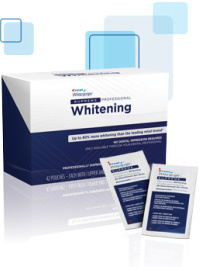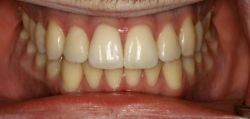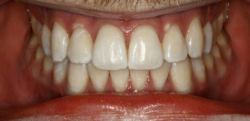
Let's face it, one of the first things you notice about people is their smile. When you meet someone with a bright, natural smile, it catches your attention.
However, over time, the natural aging process and your lifestyle can stain your teeth.
There are many things that cause teeth to become discolored over time. But now you can improve the quality of your smile by brightening teeth that have lost their sparkle over the years. Whether you have one problem tooth or a dull yellowing across all of your teeth, Dr. Kneib can treat discolored, stained, or aging teeth with our state-of-the-art whitening process.
Whitening treatments are one of the most common forms of cosmetic dentistry and can be completed in just over an hour in our office. As another option, if it's more convenient, you can choose at-home treatments. You'll notice the difference immediately, and so will your family, friends, and coworkers when you show off your new look.
Reasons teeth may become discolored over time:
- Coffee
- Wine
- Tea
- Cigarettes
- Medication
- Aging
But now you can improve the quality of your smile by brightening teeth that have lost their sparkle over the years. Whether you have one problem tooth or a dull yellowing across all of your teeth, Dr. Kneib can treat discolored, stained, or aging teeth with our state-of-the-art whitening process.
The tooth whitening treatment can be completed in just over an hour in our office or, if it's more convenient, you can choose at-home treatments. You'll notice the difference immediately, and so will your family, friends, and coworkers when you show off your new look.
Two bleaching methods are available at Kneib Dentistry:
- In-Office Bleaching - Laser Teeth Whitening - (Zoom!®)
- At-Home-Bleaching - Provides for home use (not to be confused with over-the-counter bleaching products available in local drug stores) - (Crest® Whitestrips® Supreme Professional)
The difference between the two is the strength of the whitening agent and the time it takes to get effective results. Power bleaching usually takes one visit, while home bleaching may take up to four weeks of regular use.
To get your smile back to looking its best, you should choose a whitening method that:
- Achieves the longest-lasting results
- Gives you the most naturally brilliant and uniform look
- Is clinically proven to be safe and effective
- Uses a low concentration of active ingredient (hydrogen peroxide)
- Is administered by dental professionals
How it's done in our office:
- Zoom!® whitening gel is carefully applied to your teeth.
- The gel is then activated by Zoom!®'s patented gentle LED light for 15 minutes while you relax and watch TV or listen to music.
- This process is repeated twice more before you go home with a naturally brilliant new smile.
- The newly advanced system includes intensity settings and desensitizers to customize treatment for each individual patient.
- Now, you have the included feature of whitening trays at no cost for you to continue your whitening experience.
- Must first be considered a candidate for whitening before you can receive the treatment through a no-cost whitening consult.
 |
|
|
|
|
How it's done at home:
- Crest® Whitestrips® Supreme Professional is the #1 most recommended brand of teeth whitening system among US dental professionals.
- It provides custom tray-level whitening with 14% hydrogen peroxide—the highest concentration available in a professionally dispensed take-home teeth whitening product.
- Can only be purchased through a dental professional.

Teeth Whitening FAQs
What is tooth whitening?
Tooth bleaching involves the placement of a bleaching solution on the teeth to eliminate stains and discoloration. The solution is held in place by a custom-made, see-through tray that fits over the teeth - much like a mouthpiece worn by a professional boxer.
Bleaching is a safe, effective, and relatively easy means of producing a whiter smile.
Two bleaching methods are available at Kneib Dentistry: Power Bleaching with a Laser, done at our office, and At-Home-Bleaching, which provides for home use (not to be confused with over-the-counter bleaching products, which is available through local drug stores or area suppliers).
Sensitive teeth, or those that are chipped, eroded or weakened by cavities, should be repaired or protected before they are bleached. The ideal scenario would be to have your teeth cleaned and examined before any bleaching!
How would you whiten my teeth?
Is teeth whitening right for me?
Is teeth whitening safe?
How do at-home and professional teeth whitening treatments compare?
How long does it take to see results from teeth whitening?
Are there any risks involved with whitening your teeth?
How long after whitening my teeth should I wait to eat?



